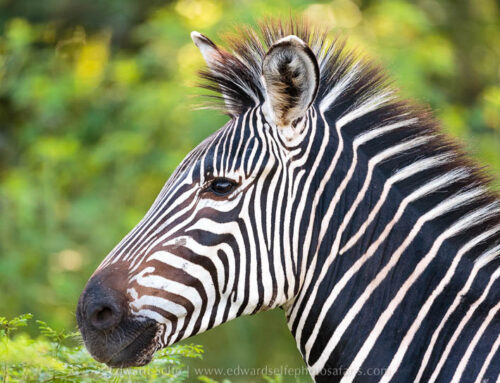We were very fortunate to enjoy an outstanding leopard sighting on our last morning of safari last week. The sighting occurred just as the sun was coming above the trees, and a shaft of beautiful light struck the cat from the side. What made the image was that much of the surroundings of the image were not hit by that same golden light, and were very dark.
The moment I saw the leopard walking down the branch and into the golden light, I advised my guests to apply an exposure compensation of -2/3 or -1.

I made this recommendation because the camera’s auto-exposure meter would have returned an image that was much too bright if we hadn’t. Here’s a mock-up of the image without the -1 exposure compensation applied:

Of course, the image is still more than acceptable, but it has lost the magic quality that the golden side-light was giving. To see why this happens, we have to consider how the camera’s auto-exposure meter functions. Assuming you have evaluative metering (Canon) or matrix metering (Nikon) applied, the camera will “see” all the very dark areas in the image and try to brighten them up to make them “middle-grey”. For a more in-depth explanation of this concept, please see my blog on tricky exposures.
My recommendation that we needed to apply -1 exposure compensation was an estimate based on experience and the following visual assessment in my head:

As we saw above, the image that results is still decent – and I suppose it could have been “recovered” using software on the computer – but I prefer to get it right in the camera and help my guests to understand the theory of why we over- or under-expose in different circumstances.
Any questions or comments on this, please do ask in the section below.



